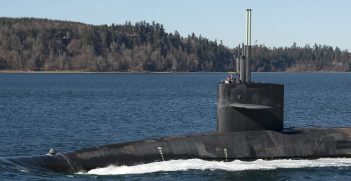What is MIKTA and Why did Penny Wong Attend?

The Mexico, Indonesia, Korea, Turkiye and Australia grouping continues to meet, showing ongoing commitment to middle power cooperation. The group has lasted longer than expected, due in part to their many shared commonalities.
While in New York for the United Nations General Assembly, Australian Minister for Foreign Affairs Penny Wong attended a meeting of MIKTA—which brings together five foreign ministers from Mexico, Indonesia, Korea, Turkiye, and Australia. Despite meeting for 11 years, it’s a contender for the title of Australia’s least-known international group.
Is it a sign that foreign policy groupings never die—what has been called the zombie category of international organisations—or does it show that there’s a continuing impetus for middle power cooperation?
When MIKTA first started I wasn’t sure if it would have staying power. But it has navigated some of the obvious dangers—first, that it would be seen as a project of specific foreign ministers. When there was a change of government in Korea, MIKTA could easily have been dumped as not fitting with new objectives. In Australia, there was the danger that MIKTA would be seen as Julie Bishop’s personal initiative, giving rise to the implication that Penny Wong would not have the same enthusiasm. But it has continued.
MIKTA has also managed the danger that alignment may shift and a grouping that looks “like-minded” a decade ago may not look so united now. Certainly, on some issues, Turkiye has become less aligned with other members of the group. Yet MIKTA is still going.
Five foreign ministers have found time to meet during UN Leaders’ Week—this year even bigger than usual due to the Summit of the Future and with Minister Wong leading Australia’s delegation. They clearly see a benefit in the grouping and are prepared to put time into middle power cooperation.
Coincidentally, I was in Indonesia for the Jakarta Geopolitical Forum speaking on the topic of middle power cooperation. The focus was on how middle powers can work together in the maritime domain—from humanitarian assistance and disaster relief (HADR) to illegal unreported and unregulated fishing (IUUF); from human trafficking and transnational crime to grey-zone illegal, coercive, aggressive and deceptive (ICAD) tactics. These challenges encompass a mix of defence, civil-military, and non-traditional threats—and are not amenable to resolution by great powers alone.
Not everyone is a fan of the middle power terminology, but the idea behind it is a sound one: that there exists a group of states that are not great powers but neither are they inconsequential or weak. They have a role identity of possessing agency and some power to shape the international system, especially through building norms. And they potentially have more impact when they work together.
So what sort of issues are on the MIKTA middle power agenda? The last MIKTA meeting in Rio De Janeiro in February focused on three priorities: strengthening multilateralism, inclusive recovery, and digital transformation. The partners expressed their collective concern about the on-going situations in both Gaza and Ukraine and stressed that it was essential for all nations to reaffirm their commitment to uphold international law and strengthen the multilateral system.
This year’s communiqué focuses on the Summit of the Future as an attempt to “build a reinforced global governance fit for purpose in the 21st Century.” As might be expected from middle powers, MIKTA ministers welcome the renewed commitment to diplomacy and multilateralism to “revitalize the multilateral architecture and commit to concrete actions to address the pressing global issues that transcend national borders, that no country may solve in isolation.”
It is good to see that MIKTA has settled on a primarily diplomatic focus. In its early years, there were attempts to raise more general public awareness of MIKTA, such as through community football, which didn’t gather much momentum. The cultural and regional diversity of MIKTA—which is an asset in expanding Australia’s diplomatic partners—mean that these wider linkages are hard to develop. MIKTA is unlikely to go down the line of BRICS where many different sectoral groups—from statisticians to hospital administrators—meet to share their experiences and learn from each other.
Academic workshops have been more successful. I attended a fascinating scenario exercise where I was genuinely surprised by how much the MIKTA countries had in common and how well the delegations worked together. MIKTA young leaders programs are also valuable. And MIKTA officials sometimes collaborate to take a shared position at international forums. (Though it is worth noting that fears that Australia would be constrained by MIKTA in forming other issue-based coalitions has not been borne out; the same week as the MIKTA meeting Australia unveiled an initiative on protection of humanitarian personnel with a different group of middle powers).
MIKTA works best as a diplomatic initiative primarily at the foreign minister level (with the leaders’ meeting at India’s G20 likely to be a one-off given the demands on leaders’ time). It is in diplomacy that there is most consonance between the disparate members.
MIKTA has lasted longer than pessimists expected. It continues to be seen as useful by the five foreign ministers involved. Even if it is hard to point to specific impact, all five countries continue to see MIKTA as having enough potential to invest in regular and institutionalised meetings. That in the end is the test of any grouping: does it deliver enough value, present or future, that leaders prioritise it in their schedules.
Melissa Conley Tyler FAIIA is the Executive Director of the Asia-Pacific Development, Diplomacy & Defence Dialogue (AP4D). She served as National Executive Director of the Australian Institute of International Affairs from January 2006 to March 2019. Jessica Subbaraman is an intern with AP4D.
This article is published under a Creative Commons License and may be republished with attribution.





